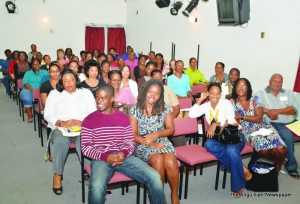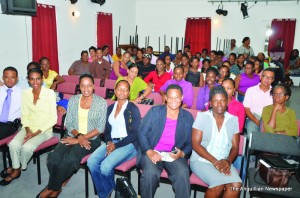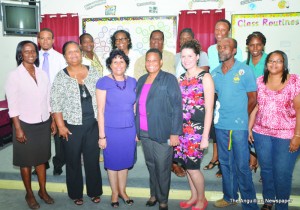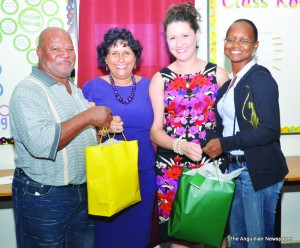
Teachers at four Government-run primary schools in Anguilla returned to their classrooms on Monday, January 14, one week after the othertwo schools reopened following the Christmas holidays.
The late reopening of The Valley Primary School, Adrian T. Hazell Primary School, Morris Vanterpool Primary School and the Alwyn Allison Richardson Primary School was occasioned by a week-long workshop.During that period the teachers were trained in the use of alternative forms of behavioural strategies in their classrooms. This is a new approach to discipline rather than the administering of corporal punishment, now abolished by the recently-enacted Education Act.

The workshop, at the Teachers’ Resource Centre, was conducted mainly by UK trainer, Tricia Campbell, who last year conducted similar training for teachers at the Vivien Vanterpool Primary School and the Orealia Kelly Primary School.She was assisted by her daughter, Lucy Oldershaw, who has taught in various schools in England, over the years, dealing with very challenging pupils.
Anguilla’s Education Officer (Curriculum), Sandra Fahie, spoke to The Anguillian about the workshop. “In our Education Act, we are looking towards the abolition of corporal punishment, something that is totally new for our teachers,” she said. “It is like a paradigm shift so we wanted to equip our teachers with alternative strategies to use in terms of modifying the behaviour of our students in our classrooms.

“Secondly, there are new ways of thinking and doing things differently. We have therefore decided to move away from the use of corporal punishment as the only, or the major, strategy for disciplining our children. It is dealing with our students in a more positive way, using positive language to them, helping them to see their negative behaviour and to understand the consequences of such behaviour. It is a way of getting them to see their behaviour as being their responsibility leading to a positive for them in terms of learning.”
Chief Education Officer, Mrs. Rhonda Connor, commented: “With this training our teachers will be further equipped to provide a learning environment which will be more conducive to learning; and where each child will feel secure and able to function at his or her best ability. I also want to emphasise that although corporal punishment has been abolished it does not mean that our children will not be dealt with if there are incidents of misbehaviour. They will just be treated differently.Our teachers have been exposed to a stage approach of dealing with incidents of misbehaviour, looking at the least means of punishment or sanctions at a higher degree.”
Tricia Campbell,the main facilitator of the workshop, said: “It was really wonderful that the Anguilla Government saw it fit to bring us back. We did the pilot work in two schools and the Government waited to see the impact before we were brought back.

“We have now done the training in the four other schools. The beauty of this was that I am a Head Teacher with many years experience – and Lucy has five years experience and she was actually able to show the teachers how the behavioural strategies work in classrooms. We were able to answer all of their questions because we come from schools which have the same stresses and strains that you have in Anguilla. We gave the teachers the tools to make the classroom a much safer environment for themselves.
“I am not an advocate of corporal punishment. It is something I have never used since I have teaching from 1967. I have had some children who I have not been able to reach, but they have been in the minority. I believe that all children deserve a chance to make the right choice.”
Lucy Oldershaw remarked: “The participation of the teachers was just amazing. We were warmly received, and I think that this system will work if they remember how well they have accepted the change this time and keep the strength and determination going.”
All of the teachers were reported to have found the workshop stimulating and helpful in their understanding of substituting corporal punishment with positive behavioural strategies in the classrooms.








